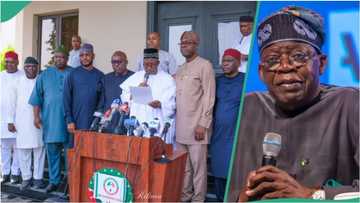Economic Hardship: Tinubu’s Govt Will Kill Nigerians, Says Atiku’s Aide
- President Bola Tinubu continues to face criticism for his harsh economic policies that have plunged Nigeria into crisis
- Phrank Shaibu, a special assistant to former Vice President Atiku Abubakar, said the current administration lacks capacity
- He stated that President Tinubu's inability to take responsibility for his government's shortcomings indicates his lack of economic ideas
PAY ATTENTION: The 2024 Business Leaders Awards Present Entrepreneurs that Change Nigeria for the Better. Check out their Stories!
Legit.ng journalist Segun Adeyemi has over 9 years of experience covering political events, civil societies, courts, and metro
FCT, Abuja - Former Vice President Atiku Abubakar's Special Assistant on Public Communication, Phrank Shaibu, expressed concern over the dire consequences of the chaotic policies implemented by the current All Progressives Congress (APC) administration led by President Bola Tinubu.
Shaibu highlighted that the lack of action to address the situation has led to severe suffering and loss of life among Nigerians.

Source: Facebook
He asserted that the widespread hunger, poverty, and hardship being experienced in Nigeria are not accidental but rather part of a deliberate strategy by Tinubu to impoverish and degrade the populace.
In a statement made available to Legit.ng, Atiku's aide said:
“Tinubu is like a quack doctor trying to treat a cancerous patient. But the quack doctor is likely to kill the patient even faster than the cancer itself. This is the dire situation that Nigerians have found themselves in.
“Rather than get to work, he continues to blame his predecessor, President Muhammadu Buhari, for handing him an empty treasury and a weak economy and the opposition for instigating mass protests. He talks as if Buhari was not a member of their diseased All Progressives Congress. He also forgets that his own kabukabu policies and its fallouts are what is instigating the mass protests across the country.”
Hardship in Tinubu's administration
He stated that during Tinubu's tenure, poverty has surged unprecedentedly, accompanied by a staggering 33% food inflation rate.
This surge is expected to lead to increased unemployment, a rise in suicides, a surge in criminal activity, and a spike in the number of children out of school.
Business operators in the private sector have voiced their grievances about the uncertainty created by the Tinubu administration, resulting in the closure of approximately 10 million small and micro businesses.
The sharp depreciation of the exchange rate and inconsistent government policies during Tinubu's term have undermined business forecasts made in the last quarter of 2023.
Shaibu pointed out that while in the past, staples like garri and beans were considered affordable for the poor, today even those are out of reach, with beans now priced at N1,500 per mudu.
Additionally, the cost of SMA baby formula has skyrocketed from N2,200 to N8,000, with no signs of the price hikes abating.

Read also
“Bottle of palm oil cost £20 in London”: Atiku’s aide defends Tinubu, predicts when economic hardship will end
He said:
“Just over a year ago, a 50kg bag of rice was N47,000, but today it is N77,000. Beans used to be N36,000, but now it is N42,000. Bread was N700 for a loaf, but now it sells for N1,200. A single egg now costs N150. Imagine how much a crate costs? Even the agbado corn that Tinubu used in campaigning is also expected to go up by over 25%, according to AFEX.
“The tragedy now is that a vast majority of Nigerians whose means can’t afford decent meals, unfortunately contend with staples meant for animals."
Economic hardship: Tinubu clearly knows nothing about economy, says Atiku's aide
Shaibu highlighted findings from a recent BBC investigation revealing that many individuals are consuming rice grains rejected by millers.
According to the report, these rejected grains are being bought by fish farmers to feed their fisheries.
Similarly, a visit to Garki Market in Abuja reveals a significant number of people lining up for maise shafts, which they are now using as a primary source of sustenance.
Typically, these shafts are sold to livestock farmers, but due to circumstances, Nigerians are now resorting to them as a staple food.
To emphasise the severity of the situation, Shaibu referenced statistics from the Federal Neuropsychiatric Hospital in Lagos, which reported a 100% increase in the number of psychiatric patients admitted in December.
Last year, when the Nigeria Economic Summit Group questioned his plan to lift over 128 million Nigerians out of poverty, Tinubu declined to disclose his strategy, citing concerns about it being stolen by other candidates.
According to Shaibu, his purported secret plan has now surfaced, allegedly aiming to impoverish and devastate Nigerians.
Shaibu asserted that Tinubu's understanding of the economy has been constrained due to his reliance on his inner circle from Lagos and prioritising loyalty over competence in appointing officials.
He criticised the appointment of at least half of Tinubu's cabinet members as lacking merit, suggesting that political considerations took precedence over the nation's welfare.

Read also
“Don’t blame Tinubu”: Oshiomhole speaks on how Buhari’s reckless policies affected Nigerians
They lamented that while Nigeria faced challenges, the President remained engrossed in political manoeuvres.
Atiku’s aide said Tinubu clearly knew little about Nigeria’s economy as he had been limited only to Lagos, which had always had a formal economy.
He said the President knew nothing about security or building a national economy, hence his over-reliance on IMF and other multilateral organisations.
FG announces plan to remove electricity subsidy
Meanwhile, the Nigerian government has expressed concern over the significant debt amassed in its power industry, highlighting its impact on electricity subsidies.
Officials stated that Nigeria owes around N1.3 trillion to power generation companies and $1.3 billion to gas suppliers.
In response to this challenge, the Minister of Power suggested that state governments may soon have the option to generate electricity to meet the needs of their residents independently.
PAY ATTENTION: Stay Informed and follow us on Google News!
Source: Legit.ng




